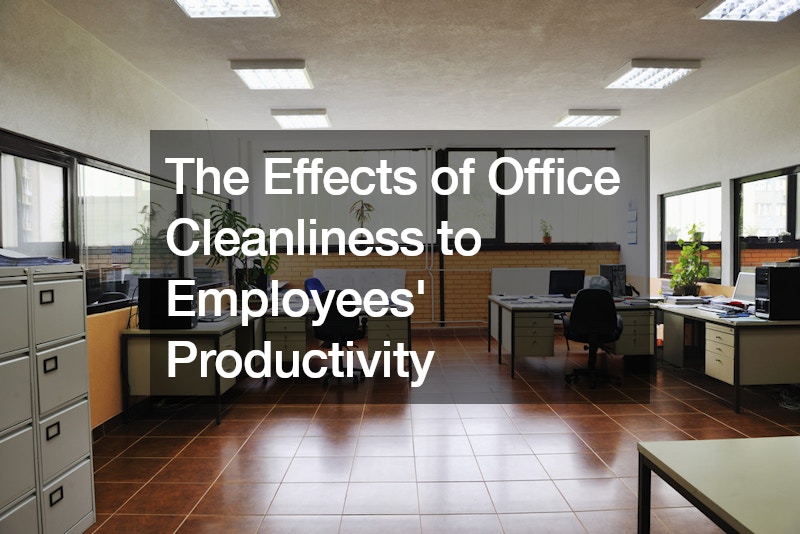Maintaining a clean and organized office environment is more than just a matter of aesthetics; it has a profound impact on employees’ productivity and overall well-being. Research shows that the cleanliness of an office space directly correlates with cognitive function, decision-making, and time management abilities. In this article, we delve into the effects of office cleanliness on employees’ productivity and explore practical strategies for optimizing workspace cleanliness.
The Link Between Office Cleanliness and Productivity
Studies have demonstrated a clear connection between physical clutter and mental clutter. A disorganized workspace can overwhelm the brain with stimuli, leading to decreased focus, heightened stress levels, and impaired cognitive function.
When employees are surrounded by clutter and mess, their ability to concentrate on tasks and make sound decisions is compromised.
Enhancing Cognitive Function
A clutter-free environment promotes clarity of thought and allows employees to process information more efficiently. By eliminating distractions and creating an organized workspace, individuals can enhance their cognitive function and problem-solving skills. A clean office fosters a conducive atmosphere for creativity and innovation, enabling employees to generate fresh ideas and solutions.
Time Management Benefits
Time is a precious resource in the workplace, and clutter can impede productivity by causing inefficiencies and delays. Searching for misplaced documents or struggling to navigate through a messy workspace consumes valuable time that could be allocated to more meaningful tasks. Implementing a clean desk policy and organizing office supplies can streamline workflow and improve time management skills among employees.
Professional Image and Morale
In addition to its practical benefits, office cleanliness plays a significant role in shaping the perception of a company’s professionalism and organizational culture. A well-maintained workspace reflects positively on the company’s values and attention to detail. Employees who work in a clean environment are more likely to feel valued and motivated, leading to higher job satisfaction and morale.
Strategies for Maintaining a Clean Office Environment
Achieving and maintaining a clean office environment requires proactive measures and a commitment to cleanliness. Employers can enlist the services of commercial office cleaning services to ensure thorough and regular cleaning of the workspace. These professional cleaning services specialize in disinfecting surfaces, vacuuming carpets, and maintaining sanitary restrooms, creating a hygienic environment for employees.
Implementing a Clean Desk Policy
A clean desk policy encourages employees to declutter their workstations at the end of each day, promoting organization and tidiness. By removing unnecessary items and organizing essential materials, employees can start each day with a clean slate and a clear focus. Implementing clear guidelines and providing storage solutions can help reinforce the importance of workspace cleanliness.
Encouraging Digitalization
In today’s digital age, many paper-based documents and files can be digitized to reduce physical clutter. Encouraging employees to digitize documents and utilize digital storage solutions minimizes the need for excessive paper storage and reduces environmental impact. Digitalization not only saves space but also facilitates easier access to information and enhances collaboration among team members.
Promoting Employee Accountability
Maintaining a clean office environment is a collective responsibility that requires the cooperation of all employees. Employers can promote accountability by educating staff on the importance of cleanliness and providing resources for organizing their workspaces effectively. Regular inspections and feedback sessions can help reinforce cleanliness standards and encourage continuous improvement.
In addition to the strategies mentioned above, it’s crucial for employers to foster a culture of cleanliness and organization within the workplace. This involves ongoing communication, training, and reinforcement of cleanliness standards. Regularly soliciting feedback from employees about their workspace preferences and addressing any concerns promptly can also contribute to a positive and productive work environment.
Furthermore, employers should consider the layout and design of the office space to facilitate cleanliness and organization. Incorporating storage solutions, ergonomic furniture, and designated areas for specific tasks can help employees maintain order and efficiency in their workstations.
empowered to maintain tidiness, organizations can reap the benefits of improved productivity, employee satisfaction, and overall success. Investing in the cleanliness and organization of the workplace is an investment in the well-being and success of both employees and the company as a whole.
Conclusion
In conclusion, office cleanliness significantly influences employees’ productivity, cognitive function, and overall well-being. By prioritizing cleanliness and implementing practical strategies for maintaining a tidy workspace, employers can create a conducive environment for optimal performance and employee satisfaction. Investing in commercial office cleaning services, implementing clean desk policies, and promoting digitalization are essential steps toward fostering a clean and productive work environment. Ultimately, a clean office is not just a reflection of the company’s professionalism; it is a catalyst for success and employee engagement.
.

